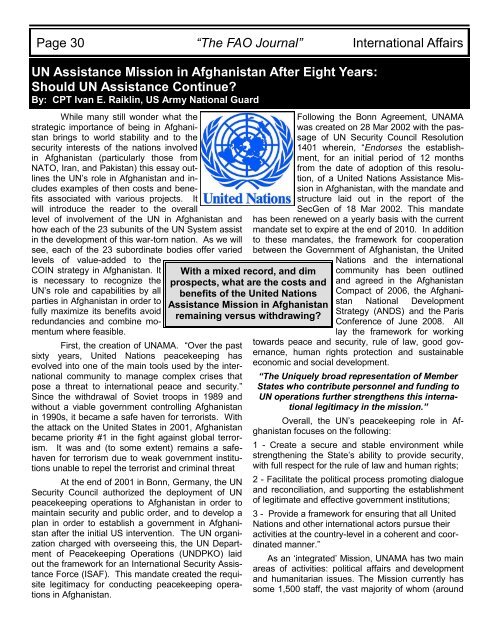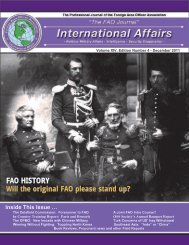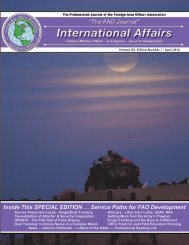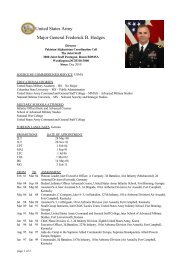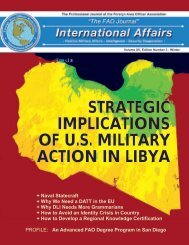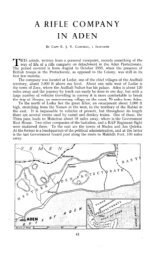Page 30 “<strong>The</strong> <strong>FAO</strong> <strong>Journal</strong>” <strong>International</strong> <strong>Affairs</strong>UN Assistance Mission in Afghanistan After Eight Years:Should UN Assistance Continue?By: CPT Ivan E. Raiklin, US Army National GuardWhile many still wonder what thestrategic importance of being in Afghanistanbrings to world stability and to thesecurity interests of the nations involvedin Afghanistan (particularly those fromNATO, Iran, and Pakistan) this essay outlinesthe UN‘s role in Afghanistan and includesexamples of then costs and benefitsassociated with various projects. Itwill introduce the reader to the overalllevel of involvement of the UN in Afghanistan andhow each of the 23 subunits of the UN System assistin the development of this war-torn nation. As we willsee, each of the 23 subordinate bodies offer variedlevels of value-added to theCOIN strategy in Afghanistan. Itis necessary to recognize theUN‘s role and capabilities by allparties in Afghanistan in order tofully maximize its benefits avoidredundancies and combine momentumwhere feasible.First, the creation of UNAMA. ―Over the pastsixty years, United Nations peacekeeping hasevolved into one of the main tools used by the internationalcommunity to manage complex crises thatpose a threat to international peace and security.‖Since the withdrawal of Soviet troops in 1989 andwithout a viable government controlling Afghanistanin 1990s, it became a safe haven for terrorists. Withthe attack on the United States in 2001, Afghanistanbecame priority #1 in the fight against global terrorism.It was and (to some extent) remains a safehavenfor terrorism due to weak government institutionsunable to repel the terrorist and criminal threat.At the end of 2001 in Bonn, Germany, the UNSecurity Council authorized the deployment of UNpeacekeeping operations to Afghanistan in order tomaintain security and public order, and to develop aplan in order to establish a government in Afghanistanafter the initial US intervention. <strong>The</strong> UN organizationcharged with overseeing this, the UN Departmentof Peacekeeping Operations (UNDPKO) laidout the framework for an <strong>International</strong> Security AssistanceForce (ISAF). This mandate created the requisitelegitimacy for conducting peacekeeping operationsin Afghanistan.With a mixed record, and dimprospects, what are the costs andbenefits of the United NationsAssistance Mission in Afghanistanremaining versus withdrawing?Following the Bonn Agreement, UNAMAwas created on 28 Mar 2002 with the passageof UN Security Council Resolution1401 wherein, ―Endorses the establishment,for an initial period of 12 monthsfrom the date of adoption of this resolution,of a United Nations Assistance Missionin Afghanistan, with the mandate andstructure laid out in the report of theSecGen of 18 Mar 2002. This mandatehas been renewed on a yearly basis with the currentmandate set to expire at the end of 2010. In additionto these mandates, the framework for cooperationbetween the Government of Afghanistan, the UnitedNations and the internationalcommunity has been outlinedand agreed in the AfghanistanCompact of 2006, the AfghanistanNational DevelopmentStrategy (ANDS) and the ParisConference of June 2008. Alllay the framework for workingtowards peace and security, rule of law, good governance,human rights protection and sustainableeconomic and social development.“<strong>The</strong> Uniquely broad representation of MemberStates who contribute personnel and funding toUN operations further strengthens this internationallegitimacy in the mission.”Overall, the UN‘s peacekeeping role in Afghanistanfocuses on the following:1 - Create a secure and stable environment whilestrengthening the State‘s ability to provide security,with full respect for the rule of law and human rights;2 - Facilitate the political process promoting dialogueand reconciliation, and supporting the establishmentof legitimate and effective government institutions;3 - Provide a framework for ensuring that all UnitedNations and other international actors pursue theiractivities at the country-level in a coherent and coordinatedmanner.‖As an ‗integrated‘ Mission, UNAMA has two mainareas of activities: political affairs and developmentand humanitarian issues. <strong>The</strong> Mission currently hassome 1,500 staff, the vast majority of whom (around
“<strong>The</strong> <strong>FAO</strong> <strong>Journal</strong>” <strong>International</strong> <strong>Affairs</strong> Page 3180 per cent) are Afghan nationals. UNAMA has18 regional and provincial offices across Afghanistanand liaison offices in Islamabad and Teheran. In theSecretary-General's March 2009 report to the UNSecurity Council, Ban Ki-Moon noted that the GeneralAssembly had agreed to a 91.5 per cent increasein budget for UNAMA to US$ 168 million. Thisfunding was geared to increase international staff by115, national Professionals by 57, national supportstaff by 249, United Nations Volunteers by 16, and toopen four additional provincial offices (Ghazni, Sar-e-Pul, Helmand and Farah) while simultaneouslystrengthening of UNAMA's regional liaison offices inIslamabad and Teheran. <strong>The</strong>se liaison offices arethe primary centers for coordination between UNAMAand Afghan‘s neighbors. It is essential to note thatthe UNAMA effort is multilateral in scope, factoring inthe interests of the two nations with the greatest interestin Afghani internal affairs. This is a key elementif a political solution is to be had-the involvementof key constituencies: Pakistan and Iran.While ―extra military resources committed toAfghanistan by US President Barack Obama andother members of NATO are much appreciated …they must be accompanied by a coherent politicalstrategy‖. In fact Kai Eide, the UN Special representativeof the Secretary-General for Afghanistan furtherstates that ―we need a strategy that is politicallyand not militarily driven…the political strategy is toooften shaped as an appendix to military thinking.‖This political strategy is accomplished throughUNAMA and its 23 elements constituting the UN―Country Team‖, similar to a US Embassy ―CountryTeam‖. Below, we will discuss these elements andthe most salient activities of each. Where relevant, Iprovide some analysis on their benefit to Afghanistanand its stability. In addition, where appropriate, I willoffer a counterargument or alternative approach toeach element. Keeping in mind that ISAF, with itsfocus on the military aspect of power projection, theUN is expected to provide the diplomatic, informationand economic capability to the host government tosupport its efforts to quell an insurgency. <strong>The</strong> level ofsuccess will be based on the ability of organs of theUN to coordinate with organs of ISAF, and to sharetheir experiences. This relationship begins by understandingeach others‘ roles and responsibilities.Here are the 23 elements engaged in Afghanistan.Afghanistan‘s New Beginnings Program - <strong>The</strong>most recent activity has been the Disbandment ofIllegal Armed Groups program totaling $116m with 9nations participating. While the program is wellintentioned,it appears the amount of money requiredto disarm the groups is quite high. If the only methodat actually disarming is done through the purchase ofthese arms, the negative impact could be that theprogram is creating a legal market for the sale ofarms that were obtained through illegal means suchas through theft or the like, creating a large profit tothose giving up arms to fund other illicit activities. Todate 44,916 weapons have been collected underDIAG with 626 IAGs disarmed as of 30 Jun 2009.Asian Development Bank - An area of acclaimedsuccess by the ADB, is in the investment in infrastructure;specifically, by bringing electricity to partsof Kabul. In fact, the ADB website boasts that ―Forthe first time in a generation, many of Kabul's fourmillion people can enjoy the benefits a regular supplyof electricity.‖ While the capability to build the capacityfor electricity is present both in the military andcivilian engineers in Afghanistan, the ADB, throughits access to donors can implement improvements ininfrastructure in the near and long term for UNAMA.<strong>International</strong> Labor Organization - <strong>The</strong> ILO is workingclosely with other UN and <strong>International</strong> agenciesin reconstruction activities in Afghanistan since 2003.More specifically the ILO Liaison Office in Kabul isproviding support in building the capacity of ILO's tripartiteconstituents e.g. restructuring the Ministry ofLabor and Social <strong>Affairs</strong>, strengthening workers' andemployers' organizations, providing employment servicesto the job seekers in 10 provinces; and on return,reintegration and temporary migration of Afghanworkers and their protection; in coordination with theGerman Government, UNHCR and Afghanistan ReconstructionTrust Fund.<strong>International</strong> Organization for Migration- IOM providesemergency relief to displaced persons, stabilizesmigrant communities and helps plan for andsupport mass population displacement. IOM programsare sponsored by the European Union, Australia,Belgium, Croatia, Denmark, Greece, Italy, Japan,Norway, Spain, Switzerland, the Netherlands,United Kingdom and the United States of America, aswell as the United Nations Central Emergency ResponseFund, North Atlantic Treaty Organization(NATO) and United Nations Development Program(UNDP). While this program is needed to help trackand manage those that are displaced due to security,environmental or other concerns, it is likely that thelisted donor nations above, contribute in order toavoid an exodus of Afghanis from emigrating to those


